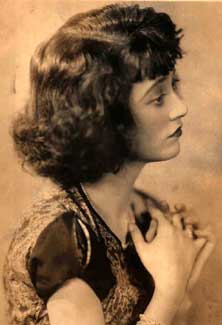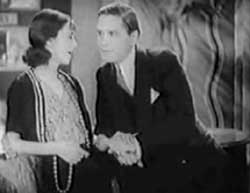 The one-reel short The Music Racket (1930) has a lively ragtime score behind the opening credits & a text card that sets the stage: "The Mac Music Co -- where murdering a song is no offense."
The one-reel short The Music Racket (1930) has a lively ragtime score behind the opening credits & a text card that sets the stage: "The Mac Music Co -- where murdering a song is no offense."
We then see an office wherein two stuffy guys of the music business, one of them Mac (Leo Donnelly) who says to "keep that dame away," when Trixie Brown (June Clayworth) has come by to sing for them, & he thinks she's awful.
But when Trixie barges in on her own, Mac turns on his friendly face & tells her to wait in room number three, where he'll be in to listen to her. He then passes through the tin pan alley offices, quickly side-tracked when he sees Lee Morse with a piano man (Bob Downey) practicing a number.
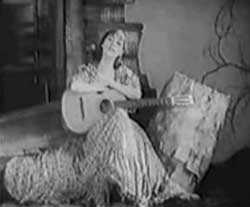 Lee wrote & recorded a great many blues & jazz numbers & starred in three musical shorts from 1930, The Music Racket for Vitaphone & two others for Paramount. Lee wrote & recorded a great many blues & jazz numbers & starred in three musical shorts from 1930, The Music Racket for Vitaphone & two others for Paramount.
She was a petite beauty only five feet tall. She & her family hailed from the Pacific Northwest, though due to her Country Blues to Dixieland bent, she was billed as "the Southern Aristocrat of Song." She was one hell of a fine jazz singer.
Mac greets Lee with genuine affection & she begins to describe the proper setting for her down-south number. The scene fades away & a stagy shanty set appears. Lee steps out of the shanty & sits down with a guitar in front of some children who listen to her sing a number.
The performance is about two-thirds reminiscent of Ethel Waters singing the blues & one-third some matron of the Carter Family singing bluegrass. It's really quite remarkable rendition of "Mail Man Blues:"
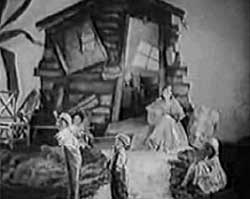 "Oh a black headed woman make a good man leave this town/ A black-headed woman make a preacher lay his bible down/ But a red-headed woman make a boy slap his pappy down..." "Oh a black headed woman make a good man leave this town/ A black-headed woman make a preacher lay his bible down/ But a red-headed woman make a boy slap his pappy down..."
Morse wrote this song herself. The version she recorded in 1924 is given quite a different interpretation; it's good, but this filmed version is even better.
When she gets to an extended strange & appealing hillbilly-squall close, two of the little black children leap up & start tapdancing awfully well for their tiny size.
A screen wipe takes us back to tin pan alley, where the manager criticizes the piece as well done but old-fashioned, & he claims to have a knock-out of a number for her, "more up to date." Unflappable Lee says she wants to stick to old favorites, so he caves in & lets her sing what she wants.
She does a crooner rendtion of Billy Rose & Walter Donaldson's 1925 classic "In the Middle of the Night" which had been a hit for Morse in 1926. It is a stuffy rendition without her usual oomph when she does blues, jazz, & bluegrass, but it'll get by.
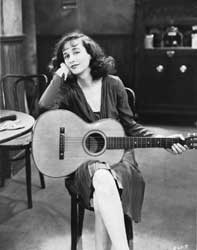 A Million Me's (1930) is a Paramount short starring Oregon native Lee Morse, with Paul Stanton & William Hillpot. It's too bad all Lee's film work was done within so few months, as her style changed over her career & in three films we only get one little slice of her manner. She was an extraordinary talent. A Million Me's (1930) is a Paramount short starring Oregon native Lee Morse, with Paul Stanton & William Hillpot. It's too bad all Lee's film work was done within so few months, as her style changed over her career & in three films we only get one little slice of her manner. She was an extraordinary talent.
A Million Me's opens with Lee at piano with no other accompaniment singing a fragment of the blues: "Ohhh, what wouldn't I do for that man." A doorbell rings. She wipes a sleeve over moist eyes & rises from the piano.
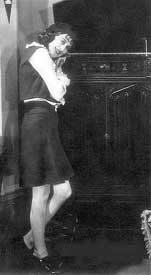 A young man enters her home & says, "Hello Miss Morse. I've brought over those records you just made for us. Oh, they're great. We'll be able to make the movie next week." She says she doesn't think so, she's too gloomy & downtrod to do anything. A young man enters her home & says, "Hello Miss Morse. I've brought over those records you just made for us. Oh, they're great. We'll be able to make the movie next week." She says she doesn't think so, she's too gloomy & downtrod to do anything.
He insists she's only feeling down because she's not in front of an audience. With his encouragement she begins to fantasize she is not alone at home, but is right at that moment in hundreds of places everywhere, a piece of her wherever her music is wound up on a Victrola.
Her visitor suggests she could right now be singing down in Georgia, but when the scene fades to a new set, Lee materializes in front of a Victrola wearing a flapper mini-skirt & silly socks, in a room where several college students are sitting about. A Yale flag is on the wall.
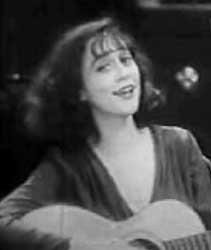 She begins to sing a 1929 ragtime number by Peter De Rose et al, in an oddly lackadaisical manner for something this up-tempo: She begins to sing a 1929 ragtime number by Peter De Rose et al, in an oddly lackadaisical manner for something this up-tempo:
"Jack & Kitty/ Sittin' Pritty/ Jack he tries to do a Romeo-oh-oh-oh/ In a second/ He starts neckin/ But she hollars Woe! Big boy oughta know/ You can hang around me all day long/ Ringer you can sing a song/ You can do & listen listen to/ But don't get collegiate."
It's a delightful if slightly silly song but the performance just isn't the best. When she completes the number, she vanishes, & the students exclaim, "Where is she!"
Jump-cut to new set, at a bar. Someone's tinkering with a really old-time jukebox, & Lee materializes with her guitar, in quite a different dress & bigger hair-do.
She saunters among the tables in the bar, sits down next to a blonde beauty, gazes into the blonde's eyes as might a lover, & sings an abbreviated version of "Mail Man Blues," this time with much more of a western swing sound with her hillbilly squalls approaching yodelling.
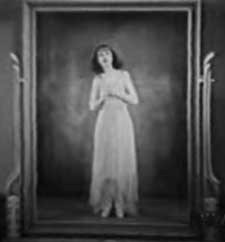 When she finishes, the blonde gal begs her to sing another, but by then Lee has vanished. We see her back in her home with the visitor trying to cheer her up. She says there's only one person she wants to listen to her, Bill, but he said he never wanted to hear her voice again. When she finishes, the blonde gal begs her to sing another, but by then Lee has vanished. We see her back in her home with the visitor trying to cheer her up. She says there's only one person she wants to listen to her, Bill, but he said he never wanted to hear her voice again.
In fact Bill is in his own apartment mooning over a photograph of Lee. The photograph comes to life & calls out "Bill! Bill!"
The full-body portrait shows Lee in evening gown. She takes a singing pose & begins singing "What Wouldn't I Do For That Man" with dramatic vaudevillian death & doom angst.
When she finishes singing to Bill, he immediately grabs the phone & calls her up to apologize. "I'm sorry I've been so mean to you. Even your picture has been singing to me."
And suddenly Lee no longer has the blues. This is a wonderful little film for its fantasy & its music.
copyright © by Paghat the Ratgirl
|
